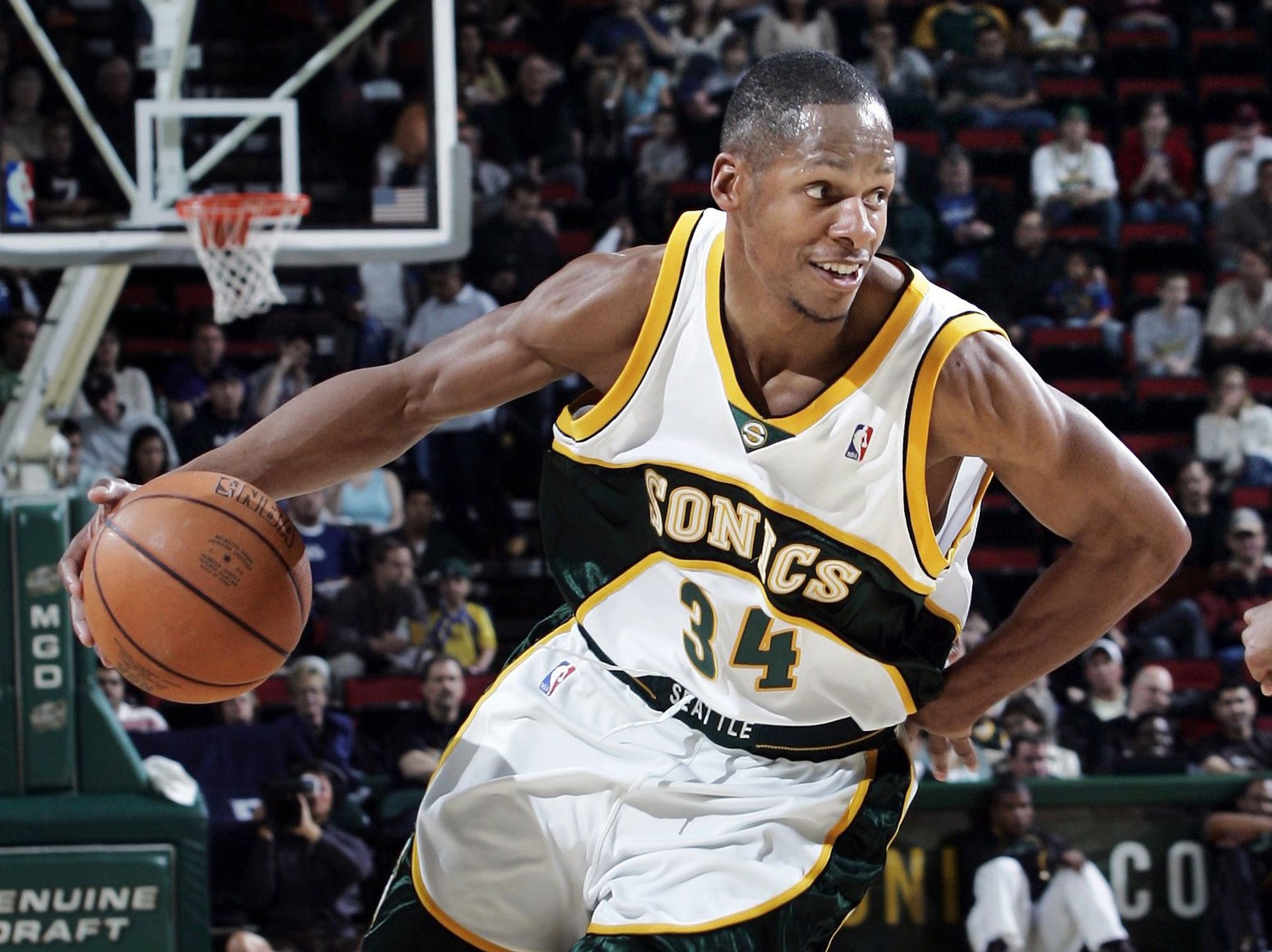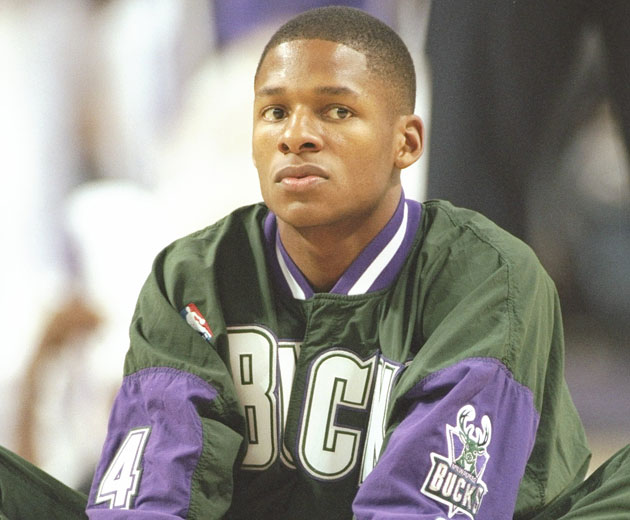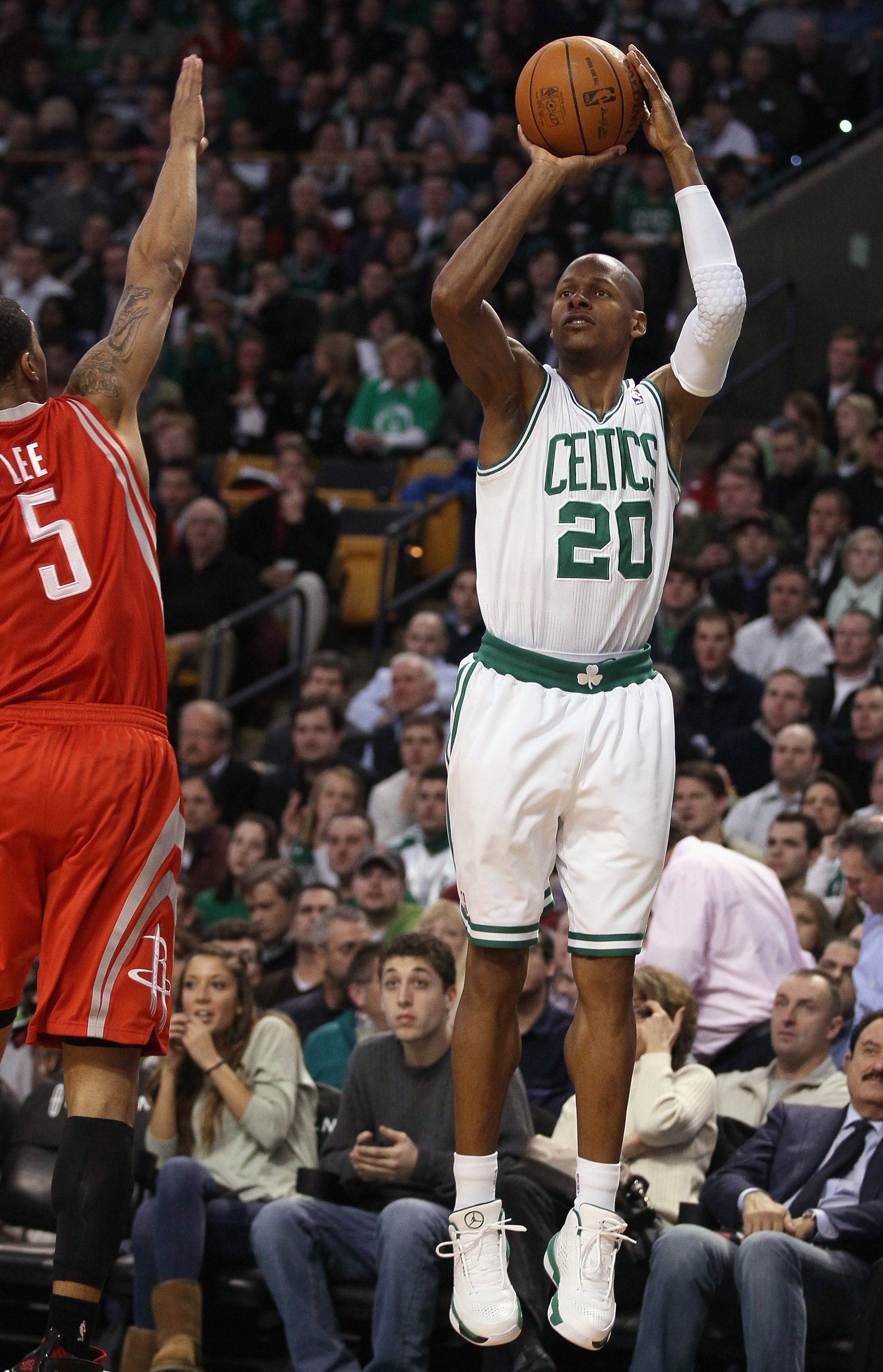Ray Allen (Part 2)
Ray Allen (Part 2)

Allen was selected by the Minnesota Timberwolves with the fifth overall pick in the 1996 NBA draft. However, he was immediately traded, along with Andrew Lang, to the Milwaukee Bucks in exchange for the rights to the fourth pick, Stephon Marbury. Subsequently, on July 24, 1996, Allen inked a three-year, $6.2 million contract with the Bucks.
Making his NBA debut on November 1, 1996, Allen showcased his talent by scoring 13 points in 28 minutes of play, leading the Bucks to a victory over Allen Iverson's Philadelphia 76ers. Throughout his rookie season, Allen demonstrated his versatility, exemplified by his performance on January 12, 1997, when he notched 22 points, 6 assists, 3 steals, and a career-high 9 rebounds in a win against the Golden State Warriors. Additionally, he participated in the Slam Dunk Contest during All-Star Weekend, finishing fourth.
Maintaining his momentum, Allen achieved another career milestone on March 25, 1997, by scoring a new career-high of 32 points in a game against the Phoenix Suns. For his impressive contributions, Allen earned a spot on the NBA All-Rookie Second Team.
The following season, 1997–98, Allen further solidified his status as a rising star, playing and starting in all 82 games for the Bucks. In the season opener, he exploded for 29 points, including six three-pointers, in a victory over the 76ers. Notably, on December 20, 1997, Allen set a new career high with 35 points against the New York Knicks. Despite a challenging season for the team, Allen's remarkable skills were on full display in the regular-season finale on April 18, 1998, as he recorded a 40-point double-double with 10 rebounds, ensuring a memorable conclusion to the campaign./cdn.vox-cdn.com/uploads/chorus_image/image/70554985/1340359347.0.jpg)
Following the conclusion of the 1998–99 NBA lockout, Allen secured his future with the Bucks by signing a lucrative six-year, $70.9 million extension on February 10, 1999, a deal that made him the highest-paid player in franchise history up to that point.
The 1998–99 season marked Allen's debut in the NBA playoffs as the Bucks secured the seventh seed. Despite his stellar performance, averaging 22.3 points per game, the team was swept by the Indiana Pacers in the first round.
In the subsequent season, Allen continued to showcase his talents, recording a career-high 13 assists in a game against the Seattle SuperSonics on January 20, 2000. Just two weeks later, he delivered a memorable performance with 36 points and 8 rebounds in a victory over the Utah Jazz. Allen's impressive contributions earned him a spot in his first All-Star Game, where he contributed 14 points in just 17 minutes of play.
During the 1999–2000 season, Allen emerged as the leading scorer for the Bucks, both in the regular season and the postseason.
On February 7, 2001, Allen achieved a significant milestone by recording his first career triple-double with 20 points, 10 rebounds, and 11 assists against the Boston Celtics. Shortly after, he participated in and won his first 3-point shootout during All-Star Weekend. Teaming up with Sam Cassell and Glenn Robinson, Allen played a crucial role in leading the Bucks to the Eastern Conference finals. He set a new playoff career high with 41 points in a Game 6 victory over the Philadelphia 76ers, although the Bucks ultimately fell short in seven games. For his outstanding performance, Allen was honored with All-NBA Third Team recognition in 2001./cdn.vox-cdn.com/uploads/chorus_asset/file/10266473/52951161.jpg.jpg)
During the 2002–03 season, Allen's tenure with the Milwaukee Bucks came to an end when he was traded to the Seattle SuperSonics midway through the season. The trade involved Allen, along with Ronald Murray, former UConn teammate Kevin Ollie, and a conditional first-round draft pick, being sent to the SuperSonics in exchange for Gary Payton and Desmond Mason. Speculation arose that Allen's strained relationship with coach George Karl influenced the Bucks' decision to trade him.
Following an injury-plagued 2003–04 season, Allen bounced back and was honored with a selection to the All-NBA Second Team in the 2004–05 season. Alongside teammate Rashard Lewis, he played a pivotal role in leading the SuperSonics to the Conference semifinals in 2005.
In July 2005, Allen committed to the SuperSonics by signing a lucrative five-year, $85 million contract.
Allen continued to solidify his place among NBA elite during the 2005–06 season. On March 12, 2006, he reached a significant milestone by becoming the 97th player in NBA history to score 15,000 points. Later, on April 7, 2006, he climbed to second place on the NBA's all-time list for three-point field goals made, trailing only Reggie Miller. Subsequently, on April 19, 2006, Allen shattered Dennis Scott's decade-old record for the most three-point field goals made in a single season in a game against the Denver Nuggets. However, this record was later surpassed by Stephen Curry.
In the 2006–07 regular season, Allen delivered one of the best performances of his career, averaging a career-high 26.4 points per game, along with 4.5 rebounds and 4.1 assists per game. On January 12, 2007, he showcased his scoring prowess by tallying a career-high 54 points against the Utah Jazz in a thrilling 122–114 overtime victory, marking the second-highest point total in SuperSonics history. Unfortunately, Allen's remarkable season was cut short due to ankle surgery on both ankles, forcing him to miss the remainder of the 2006–07 season.
References
- "Connecticut Men's Basketball Inaugural "Huskies of Honor" Inductees Announced". uconnhuskies.com. December 26, 2006. Archived from the original on September 29, 2007.
- ^ Borges, David (December 7, 2018). "Ray Allen, Rebecca Lobo to have their numbers retired by UConn". New Haven Register. Retrieved February 8, 2019.
- ^ Gonzalez, Isabel (May 7, 2023). "LOOK: NBA legend Ray Allen graduates from UConn, takes memorable photo with fellow graduates". cbssports.com. Retrieved May 8, 2023.
- ^ "NBA.com: 1996 NBA Draft, First Round". www.nba.com. Retrieved June 27, 2019.
- ^ "Ray Allen". sportrac.com. Retrieved July 30, 2021.
- ^ "(1996) Allen Iverson & Ray Allen Make Their NBA Debuts Against Each Other". Retrieved June 27, 2019.
- ^ "NBA.com: Slam Dunk Year-by-Year Results". www.nba.com. Retrieved June 27, 2019.
- ^ "Year-by-year NBA All-Rookie Teams". NBA.com. Retrieved June 27, 2019.
- ^ "Minnesota Timberwolves at Milwaukee Bucks Box Score, April 18, 1998". Basketball-Reference.com. Retrieved June 27, 2019.
- ^ "Allen Goes One on One and Gets $70.9 Million". Los Angeles Times. February 11, 1999. ISSN 0458-3035. Retrieved June 27, 2019.
- ^ "1999 NBA Eastern Conference First Round – Milwaukee Bucks vs. Indiana Pacers". Basketball-Reference.com. Retrieved June 27, 2019.
- ^ "Milwaukee Bucks at Utah Jazz Box Score, February 3, 2000". Basketball-Reference.com. Retrieved July 30, 2021.
- ^ "2000 NBA All-Star Game Box Score". Basketball-Reference.com. Retrieved June 27, 2019.
- ^ "Ray Allen 2000–01 game log". Basketball-Reference.com. Retrieved June 27, 2019.
- ^ "Milwaukee Bucks at Boston Celtics Box Score, February 7, 2001". Basketball-Reference.com. Retrieved June 27, 2019.







































